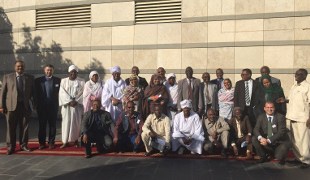The Max Planck Foundation convened a capacity building workshop for a total of 25 representatives of various political parties and stakeholders
The Max Planck Foundation convened a capacity building workshop for a total of 25 representatives of various political parties and stakeholders, which took place in Khartoum from 30 November to 3 December 2014. It focused on technical aspects of designing constitutional processes. The workshop was part of a larger project that was being supported by the German Foreign Office and the European Union and was implemented by the Max Planck Foundation.
The workshop endeavoured to bring together an inclusive group of officials, policymakers as well as state and non-state actors representing the various political viewpoints in Sudanese society together with national and international experts as well as researchers from the Max Planck Foundation for a detailed comparative and technical discussion on possible options for a constitutional process. The workshop was distinctly aimed at providing a neutral forum for a wide range of representative viewpoints in Sudan on options regarding a possible constitutional process and attempted to imbed a spirit of communication, trust and commitment towards a peaceful constitutional process throughout the four days. It was academic and technical in its nature and substance and the format was designed to provide a collegiate atmosphere for dialogue and discussion.
The overall project aimed to support Sudan in its National Dialogue. With this goal in mind, the Foundation intended to provide legal support and assistance to this far-reaching National Dialogue through capacity building measures for an inclusive group of actors. Individual project activities included discussions on the elements and structure of constitutional processes and fundamental principles of constitutional law. Ultimately, a successful National Dialogue can only be achieved through cooperation between participants and an inclusive process. Project activities thus used a comparative legal approach to promote and encourage discussions about options for constitutional arrangements between different interest groups. This requires building mutual trust on an on-going basis and increasing the confidence of participants in one another and the whole process through various activities, such as joint capacity building measures.

